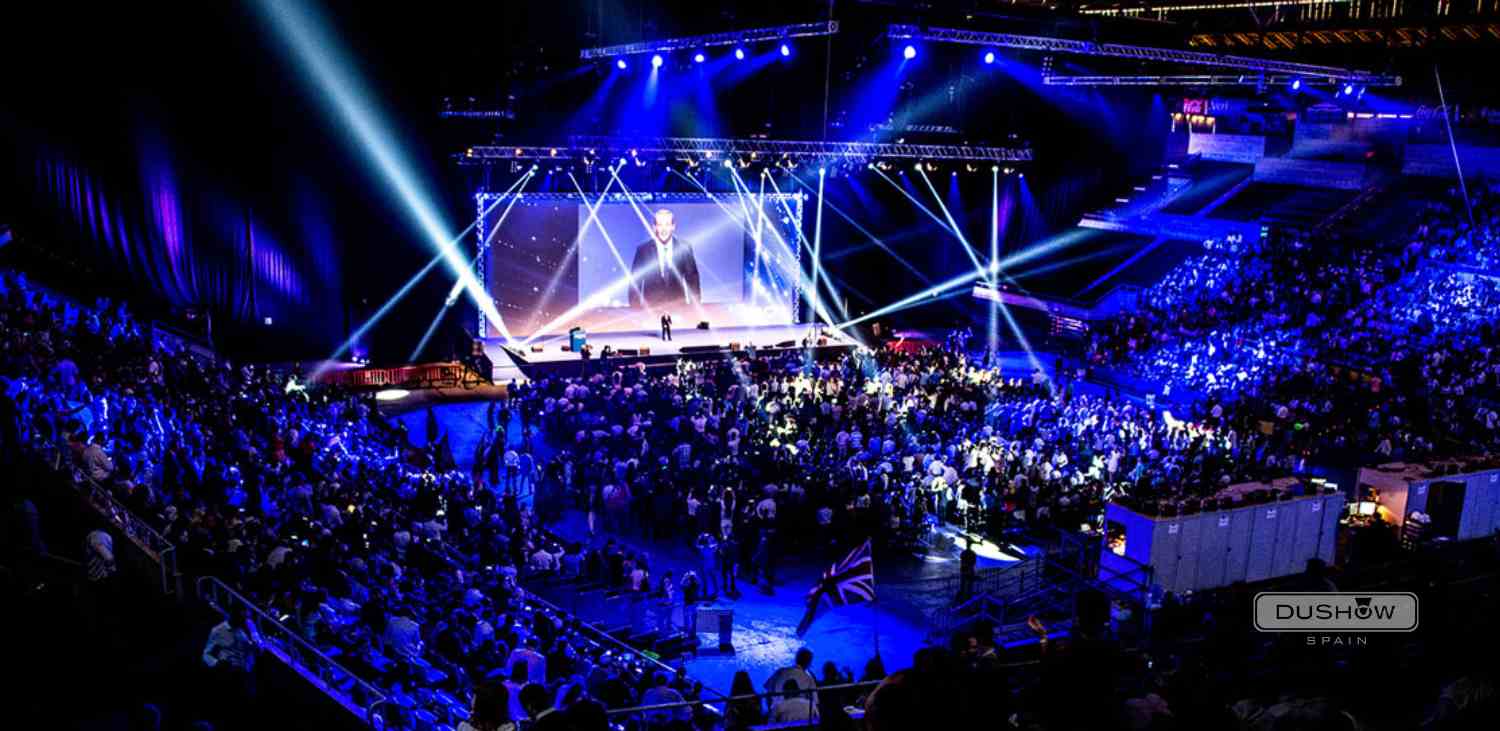Just How Event Production Functions: A Comprehensive Consider the Process
Event production is a complex and organized procedure that requires careful preparation and execution. It begins with establishing clear purposes and recognizing the target market. Each action, from budgeting to place option, plays an essential duty in making sure success. As the procedure unravels, numerous aspects should line up effortlessly. Yet, the nuances of this intricate procedure commonly go undetected. What are the key phases that add to a memorable event?

The Initial Planning Stage
When beginning on event production, mindful preparation is necessary to guarantee an effective result. The preliminary preparation stage functions as the foundation for all subsequent efforts. Throughout this phase, event producers need to define the event's function and goals clearly. Determining the target audience helps tailor the experience and messaging, assuring importance and engagement.Producers have to additionally take into consideration the event layout, whether it be in-person, digital, or crossbreed, as this will certainly affect different logistical aspects. Picking an appropriate date and venue is crucial, as it impacts accessibility and availability.Furthermore, setting up a trusted group is fundamental for separating duties and simplifying interaction. Developing a timeline with turning points guarantees all jobs are finished on timetable. This stage involves thorough study, including determining potential obstacles and developing strategies to minimize dangers. Ultimately, a well-structured first planning stage sets the tone for an effective event production trip.

Budgeting and Source Allocation
In event production, efficient budgeting and resource allocation are important for success - event production charlotte. Establishing economic parameters establishes the structure for all subsequent choices, while resource distribution approaches ensure that every element of the event is adequately supported. With each other, these components help keep control over expenditures and enhance making use of offered sources
Establishing Financial Parameters
Developing financial specifications is vital to the success of any type of event production, as it establishes the structure for effective budgeting and resource allowance. This procedure begins with defining the total budget, which encompasses all elements of the event, consisting of venue expenses, food catering, and marketing. By identifying readily available funds, event planners can focus on expenses and allot sources as necessary. Furthermore, it is important to carry out thorough marketing research to expect prospective prices and recognize funding sources, such as sponsorships or ticket sales. Establishing clear financial parameters also help in danger monitoring, permitting planners to set aside backup funds for unforeseen costs. Inevitably, a distinct spending plan works as a roadmap, leading the event production group in the direction of attaining their objectives while preserving monetary control.
Resource Distribution Techniques
Effective source distribution methods are crucial for making the most of the impact of an event while adhering to budget restraints. Effective event production needs a careful technique to budgeting and source allowance. Coordinators must focus on vital aspects such as venue, wedding catering, and innovation, guaranteeing that funds are assigned to locations that improve attendee experience. A detailed spending plan must lay out anticipated costs and identify locations for possible expense financial savings, such as discussing with vendors or discovering sponsorship opportunities. In addition, tracking expenses throughout the planning procedure assists protect against overspending. By utilizing strategic source circulation, event manufacturers can supply a remarkable experience while keeping monetary duty, eventually adding to the general success of the event.
Place Selection and Logistics
Picking the ideal venue is vital to the success of any type of event, as it establishes the phase for the overall experience. Location option includes assessing various aspects, including capability, accessibility, and area. Planners should take into consideration the target market and the nature of the event, making certain the venue lines up with the event's goals.Logistics play a substantial role in this process, entailing arrangements for seating, audiovisual equipment, and catering solutions. An appropriate venue should assist in smooth circulation for attendees and staff, enhancing engagement.Additionally, examining possible locations for facilities like auto parking, toilets, and emergency leaves is very important for security and convenience. The timeline for safeguarding the place is also important, as prominent places may schedule rapidly - event production charlotte. Detailed planning and prompt execution can eventually contribute to a seamless event experience, making place option and logistics fundamental elements of successful event production.
Creative Concept Growth
While the place sets the physical stage, creative concept development shapes the event's identity and story. This process begins with determining the event's function and target audience, permitting event manufacturers to formulate a compelling motif that reverberates with guests. Brainstorming sessions often consist of diverse viewpoints, fostering cutting-edge concepts that line up with the event's goals.Once a motif is established, aesthetic components such as shade palettes, signs, and design are developed to enhance the general environment. Narration techniques might also be incorporated to produce an interesting journey for individuals, ensuring a memorable experience. Additionally, factors to consider pertaining to enjoyment, activities, and interactive parts are lined up with the chosen idea, reinforcing the style throughout the event.Ultimately, effective creative idea development warranties that every element of the event works cohesively, leaving an enduring impact on guests and fulfilling the event's goals. This fundamental work prepares for succeeding planning and implementation phases.
Working together With Vendors and Distributors
Successful event production rests on reliable collaboration with vendors and distributors. Selecting reputable companions, negotiating agreements effectively, and making certain timely shipments are important action in why not try here this process. Each of these elements adds substantially to the overall success and smooth implementation of an event.
Choosing Reliable Allies
Just how can event planners ensure a seamless production experience? Picking dependable companions is important in achieving this goal. Event coordinators must carry out extensive study to identify suppliers and distributors with a proven record of quality. This consists of checking references, evaluating profiles, and reviewing customer comments. Coordinators must focus on companions who show professionalism and reliability, prompt interaction, and a willingness to collaborate. Building solid partnerships fosters count on and enables quick analytic throughout the event. Furthermore, it is valuable to pick local vendors who recognize the place and regional logistics. Eventually, a successful event rests on the synergy between organizers and their companions, making sure that every aspect of production runs efficiently and successfully.
Working Out Contracts Effectively
Efficient arrangement of contracts is an essential action in the cooperation between event planners and their suppliers and vendors. This process includes clear interaction of assumptions, deliverables, and timelines. Coordinators should perform comprehensive research on market prices and sector requirements to establish a baseline for settlements. It is very important to produce a collaborative ambience, encouraging open dialogue concerning terms, prices, and potential contingencies. Coordinators need to additionally focus on comprehending the vendor's capabilities and constraints to straighten their needs effectively. Adaptability can lead to mutually helpful contracts, fostering lasting partnerships. Crafting well-defined contracts that include details efficiency metrics can help assure accountability, eventually bring about effective event implementation and fulfillment for all parties included.
Guaranteeing Timely Deliveries
Timely distributions are vital for the smooth execution of any event, calling for persistent collaboration between coordinators and their suppliers and providers. Effective communication is crucial, as it aids develop clear assumptions regarding shipment routines, amounts, and certain demands. Coordinators often create detailed timelines to outline vital turning points, making sure all events continue to be aligned throughout the procedure. Routine check-ins with vendors can aid recognize potential hold-ups early, enabling for aggressive services. Furthermore, building strong relationships with reputable suppliers fosters depend on and responsibility, which can cause far better service and prioritization. By prioritizing these joint initiatives, planners can reduce disruptions, thus improving the total effectiveness of event production and guaranteeing that all needed products and solutions show up as prepared.
Advertising and Promotion Methods
While organizing an occasion, the success of advertising and marketing and promo techniques can substantially influence presence and interaction. Efficient techniques often consist of a combination of electronic marketing, standard marketing, and grassroots outreach. Making use of social networks systems permits for real-time communication and targeted marketing, reaching details demographics successfully. Email advertising projects can further engage possible attendees with personalized web content and reminders.Collaborations with influencers or industry leaders can also improve reputation and widen reach. Developing appealing web content, such as video clips or blogs, assists to create buzz and endure interest leading up to the event. In addition, leveraging early-bird discount rates and exclusive advantages can incentivize ticket purchases.Promoting with standard networks, such Visit Your URL as posters or neighborhood their explanation media, stays pertinent, especially in community-focused events. A complete method that incorporates multiple methods warranties optimum presence and involvement, inevitably adding to the event's success and the development of a remarkable experience for attendees.
On-Site Implementation and Management
On-site execution and monitoring are necessary parts that establish the overall success of an event. Reliable coordination during the event ensures that all components align with the planned program. Event managers supervise logistics, including vendor coordination, devices arrangement, and visitor services. Keeping an eye on timelines and addressing any unexpected concerns are basic for preserving a seamless experience.The staff plays a substantial duty, as skilled workers are accountable for numerous jobs such as registration, information circulation, and technical support. Interaction among employee is vital; it fosters a joint atmosphere and allows fast resolution of challenges.Additionally, security methods have to be followed, securing the well-being of all participants. Post-event examinations are likewise part of on-site management, providing understandings for future enhancements. By concentrating on these elements, event manufacturers can produce unforgettable experiences that meet or go beyond guest assumptions while accomplishing the event's objectives.
Frequently Asked Inquiries
Just how Do I Pick the Right Event Style?
Choosing the best event motif includes taking into consideration the target audience, event objective, and venue. Investigating existing trends and gathering input from stakeholders can likewise motivate innovative concepts that reverberate and create an unforgettable experience.

What Are Typical Errors in Event Production?
Common blunders in event production usually consist of insufficient planning, inadequate communication among staff member, budget mismanagement, disregarding to take right into account the audience's demands, and failing to perform a complete post-event examination for future improvements.
Just How Can I Determine Event Success?
To gauge event success, one can assess participant contentment, engagement degrees, budget adherence, and post-event responses. Key efficiency indicators, such as ticket sales and social media communications, likewise offer valuable understandings into general performance.
What Should I Do if It Rains on the Event Day?
In case of moisten the day, the coordinator should apply contingency strategies, such as safeguarding camping tents or relocating activities inside. Interaction with attendees about adjustments is important to guarantee a smooth experience regardless of weather condition difficulties.
How Can I Make Sure Participant Engagement During the Event?

Comments on “How to elevate your event’s success with expert event production charlotte”